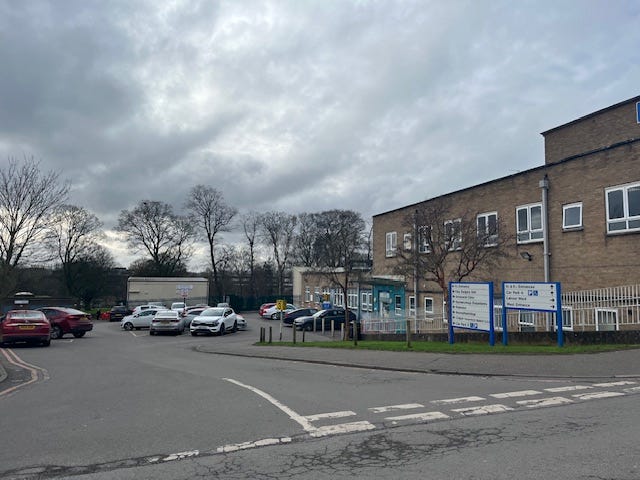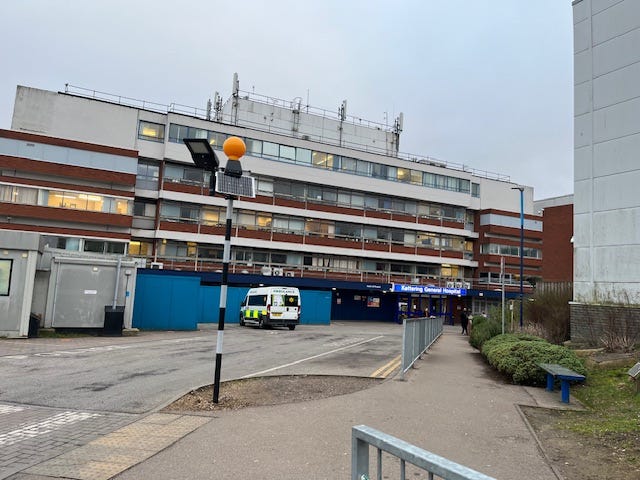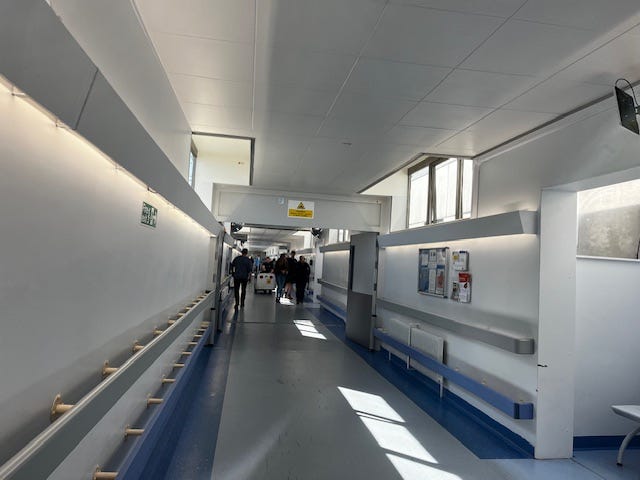'I know what I'm doing and we will improve'
The boss of Northamptonshire's two general hospitals Richard Mitchell spoke to us about his plans
“I recognise as a white male heterosexual chief executive, my experience by and large is one of privilege. I am very sadly aware that colleagues experience discrimination, but I am determined that my largely positive experience of work will in the future be experienced by all.”
Richard Mitchell has been in charge of the county’s two hospitals for almost six months. In October last year, following the sudden departure of former boss Simon Weldon, he was appointed chief executive of the University Hospitals of Northamptonshire Group (that contains Northants’ two acute hospitals) adding to his job as chief executive of the University Hospitals of Leicester NHS Trust.
On a salary of at least 260,000 per year - the actual figure won't be known until the annual accounts are reported later this year - he is on a big salary, but undoubtedly has a huge job. Both hospitals are rated by the Care Quality Commission as requiring improvements and along with most NHS organisations across the country are running over capacity, with waiting lists growing quarter on quarter. He also has to manage these hospitals along with the three that make up the Leicester group. However he is not a rookie, having been a hospital chief executive for seven years, firstly appointed in Nottingham and then at the Leicester hospitals group two years ago.
Asked what his initial priorities of the job have been he says:
“The priority for me is understanding more about Northampton General Hospital [NGH], Kettering General Hospital [KGH] and the people who work there. What I mean by that is the NHS has fantastic people in it, who are very committed and under pressure and what I want to be doing is to make their working lives better.
“There is a whole body of evidence in the NHS and beyond that says if you focus on the people who work in the organisation, inevitably that will lead to better service.
“I am trying to understand more about what are the experiences of working in Northampton and Kettering?’ They are two different organisations, they will have two different cultures. I am keen to improve the experience of all who work in the organisation and I’m keen to find a balance between ensuring that we have strong, viable services and the two hospitals work more closely together than they have been doing previously.”
Culture
According to the results of the staff survey, the culture of both organisations need some significant improvement. The staff survey that was published in March (a statutory requirement) showed that the hospital staff feel there is a real issue with racism and discrimination. Several hundred of the seven thousand plus people who answered the survey said they have experienced discrimination from a manager or colleague.
This issue has been flagged up in a number of staff surveys and at the latest board meeting the chair John MacDonald said the mostly white board had to acknowledge the organisation’s racism issue.
Richard says: “We need to be bold in declaring that the staff survey and the conversations I have with colleagues on a day-to-day basis tells us that discrimination exists and we need to do something to tackle it.
“One of the things is a relentless focus on culture. At UHN [University Hospitals Northamptonshire Group] we launched our tackling racism strategy and made sure we have a full action plan in place to address all of the areas in the staff survey and that came up in conversation.
“What the staff survey results tell us is we have more to do and the board must hold itself and the organisation to account when it comes to making UHN a more inclusive place of work.
“I recognise as a white male heterosexual chief executive, my experience by and large is one of privilege. I am very sadly aware that colleagues experience discrimination, but I am determined that my largely positive experience of work will in the future be experienced by all.”
Waiting lists
Latest figures reported to the board state that NGH has a waiting list of 40,414 people while KGH has 29,279 people waiting for treatment. At NGH 1,506 of that number have been waiting for more than a year, with 395 people at KGH spending 12 months or more waiting to be treated.
Richard says:
“This is a national problem and in general Northampton and Kettering from a planned care and diagnostics perspective have performed comparatively well in the past. What we are now seeing is, while the maximum waits for care are reducing, we are seeing the number of patients on waiting lists increase.
“There are a couple of things we are doing. When we look at the waiting list of KGH and NGH for different services there will be different waiting times and so we plan to offer a choice, where you could travel from Northampton to Kettering or vice versa if you wanted to, to be treated more quickly.
“We need to continue the work we are doing to improve productivity which means treating more patients within the same capacity, in particular outpatients is a key area of focus because that is predominantly where patients are waiting at the moment and we need to continue to develop plans to increase capacity and to increasingly use modern methods of treatment. That includes things such as digital appointments, virtual appointments, use of AI. Medicine and healthcare is changing rapidly and we want Northamptonshire to be at the forefront of that.”
Accident and emergency problems
At the start of this year Kettering and Northampton hospitals declared critical incidents - a situation in which the hospitals say they are under extraordinary pressure and at that point will not be able to function as normal.
The critical incidents came about because more people had been trying to get emergency help than the hospitals had capacity for. The board papers refer to ‘overcrowding’ and in January* only 58 percent of people who went to the A and E department were seen within the four guidelines, with 68 per cent at NGH being treated in the four hours.
The hospital boss says:
“We have two emergency departments working under pressure over a sustained period. It is very difficult to work effectively under sustained pressure, so I think with Northampton and Kettering working more closely together it is a great opportunity to bring the great practice in Northampton to Kettering and vice versa. There are always improvements to be made between the interface between the emergency department and the wards that patients are going to and there are always opportunities to improve the discharge process.”
At the recent board meeting one member said bosses needed to concentrate on tackling the issue of super stranded patients - people who have been in hospital for more than 21 days despite being fit to be discharged. This situation arises often because they have nowhere to go with suitable care.
Currently there are 271 super stranded patients across the two hospitals. In June the various health organisations and the local authorities will hold a summit to come up with new ideas to solve the problem.
Richard says:
“We would recognise that across the public service, locally, regionally and nationally, they are all under huge pressure. We are all experiencing more people using our services than we have capacity for. We will have an urgent and emergency care summit with all colleagues across Northants involved to ensure that our plan is the best possible plan it can be. We are quite rightly putting a lot of importance on that because not only does it enable us to focus on taking short term actions, but we also want to ensure that we spend sufficient time agreeing what our long term plan is.
“I have huge sympathy for local authorities, but clearly the super stranded patients are part of the problem - but they are only part of the problem. I would suggest half of the things that need to change sit fully within the remit and control of UHN and me and we obviously need to continue to work effectively with and strengthen our relationships with general practice, the local authorities, the community sector and Northamptonshire healthcare.”
Joining forces with UHL
At the most recent board at the start of this month, the members agreed to set up a joint partnership board between the neighbouring hospital groups. The board will have the power to make financial decisions for both hospital groups.
But Richard insists this new arrangement is not a merger.
He says: “What we talk about is two relationships. You have the long standing relationship between Kettering and Northampton and the strengthening of the relationship between Northampton, Kettering and Leicester. I think there are multiple benefits between those organisations working together. It gives us greater opportunity to recruit, and opportunities around procurement. It opens up opportunities to get additional capital in to refurbish our buildings. There are loads of benefits there that will improve patient experience.
He continues:
“We already know the UHL provides a lot of specialist care for patients from Northamptonshire. Glenfield provides regional services for Leicester, Northampton and beyond. What I am not saying is patients who currently receive their care in Kettering are then going to be receiving their care in Northampton and Leicester.
“What I am saying is that for a range of reasons, when you look at most services there is a differential wait between the three hospitals and we have to take big steps to reduce the overall waiting time and reduce that gap and one of the options is to give patients choice. That does not mean us instructing patients that they have to move.”
Long term commitment
He and his family live on the Northants, Leicester border and he says he plans to be in the job for a long time. He also says he wants to be accessible to patients and ‘if people are not able to resolve things locally, as the chief executive I’m very comfortable with people contacting me directly.’
Asked what he will view success as, he says:
“I think it is important that while progress is required, UHN does many things exceptionally well on a day to day basis. The responsibility and the importance of healthcare is up there with the most important things in life, so I'm proud of the team and what they do on a daily basis.
“How will I know when things are beginning to change? For me it is about, ‘Is the organisation beginning to feel different? Am I beginning to have conversations in the corridor where people are saying it begins to feel different?
“Am I receiving emails where people begin to acknowledge the changes we are making?
“The staff survey is an important reference point, but you only get that information once a year. Living locally, one of the benefits is that I have friends and people I bump into at children’s birthday parties who receive care and work in the organisation. ‘What is their experience?’
"When some of that messaging starts to change I will then know we’re on the right track. We have to be realistic because the NHS is under significant pressure at the moment and change takes time, but I believe that while this is a team effort, I believe the record that I have of working in Leicester and up in Nottingham should give people encouragement that I know what I’m doing and we will improve UHN.”






About 20 years ago I served on the Equality Committee at NGH. Fine words, fine action plans, but nothing really changed. After a year or so the committee was abolished. So not really surprised by this report.
On the question of waiting lists may be someone should look into how consultants operated a system which appears to encourage longer NHS waiting list and supports their private work. An investigation into whether some consultants are fully carrying out their work contracted with the hospital or spending most of their time treating private patients who have been "referred" to them by the NHS due to the long waiting lists which they have (may be?) deliberately created. I have heard it said that the same consultant has told a patient that the waiting list for NHS treatment at the hospital is 6 weeks, but they can be seen immediately via an NHS referral (paid for by the NHS) to a private hospital where the same consultant will undertake the same procedure. This cannot be right.
Another important and very relevant interview. As a punter I find it very worrying that hospitals, like schools under the academy system, are being grouped together in bigger and bigger entities. Presumably this brings economies of scale [like supermarket chains] but must surely result in a corporate mindset at management level? I think nursing staff should be more involved in the management of hospitals - they're the ones who have patients' issues in their minds. Matrons and senior sisters make decisions that are more likely to please the public than accountants and consultants with their eyes on private work.